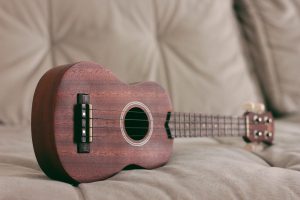Is using a ukulele chord progressions generator right for you?
It might be, especially if you have ever struggled to find that perfect chord progression when writing a song.
Maybe you know a few basic ukelele chords that sound good together but are hoping to expand your knowledge of chords in different keys. If so, you’ve come to the right place! In this blog, we will talk about using a ukulele chord progressions generator to write songs.
While this article will look specifically at ukulele chord progressions, this tool can be applied and used with whatever instrument you play or whatever instrument you would like to learn!
How Do You Make a Good Chord Progression on a Ukulele?
A chord progression is simply the process of choosing the ukelele chords that sound the best and putting them together in the right order. Here are four good chord progressions you can make on the ukulele:
- I-IV-I-IV
- I-V-vi-IV
- I-V-II-VI-III
- Ii7-vi7-ii7-v7
Does that look (or sound) like all Greek to you? Here’s a video that might help break things down a bit so you understand how to write and play a song on the ukulele:
We’ll take a deeper dive into how to make ukulele chord progressions on your own and with a chord progressions generator in this post!
Building Chord Progressions (On Any Instrument)
So just what the heck is a ukulele chord progressions generator, anyway? A chord progression is a series of chords played throughout a piece of music. These chords are usually (although not always) in the same key. What the chords have in common is that they all sound good together. Musically, they tell a “story.”
Here’s a video to help you understand how chord transitions work when you’re playing the ukulele:
Most guitar and ukulele players are familiar with at least some chords from two major keys- G and C, and with a series of 4 chords that sound good together within those keys. In these keys, several of these chords overlap. Many popular songs use “G” “C” “Am” and “Em.” The reason for this is simple- they are easy to play and share chords from both the key of C and the key of G. As such, it is very common for a beginner guitarist or uke player to get stuck in a “rut” of only playing some variations of the same.
So how do we get out of that rut? Some basic music theory and understanding ukulele notes can help.
Chord Progressions Can Help You Out of a Musical “Rut”
Let’s look at the C major key. This is the easiest of keys to learn because it has only natural notes. That means no sharps or flats to memorize. Briefly, a key has seven chords in it. We notate the chords in the key signature using Roman Numerals; we number the chords in a major key like this: I ii iii IV V vi vii (diminished).
Every lower case Roman numeral tells us that we play a minor chord, and every uppercase Roman numeral tells us to play a major chord. So, if we remember that there are seven notes in the musical alphabet, and that the first chord of a key is how the key is named, we know that the chords in the key of C major are: C major, D minor, E minor, F major, G major, A minor, and B diminished. You then repeat this formula with every key, taking into account the sharps and flats that belong to the particular key you are trying to play in. And of course, within each key, there are “7” chords, “6” chords, chord inversions, and so on!
Sound complicated? Now you see why ukulele players can find themselves repeating the same few chords, in the same few keys, over and over again. Thankfully, in 2020, we have the benefit of ukulele chord progressions generators to help us expand our musical knowledge and quickly learn new and varied chord progressions. All without memorizing all the possible keys in the musical language.
6 Common Chord Progressions for Ukulele
Whether you’re using a ukulele chord progressions generator or not, there are a few basic ukulele chord progressions and riffs you should master. There are many more than just these six, but these ukulele chords should help get you started as you are learning how to play this fun instrument!
The La Folia Progression
The Doo Woop Progression
The Blues
Sensitive Progression
This chord progression uses AM-F-C-G and is great for sadder songs or those with deeper meanings.
Flamenco Progression
Classic Rock Progression
This chord progression has a few different variations and can be a bit challenging to learn on the ukulele. Two common variations include C-Bb-Eb-C and C-Bb-G-C.
They both sound great and can give a driving, upbeat tone to whatever it is you are learning how to play!
It is important to note that while it is acceptable to use common ukelele chord progressions as you’re learning how to play, they cannot be copyrighted – it is the melody of a song that ultimately will be copyrighted. Just a fact to keep in mind!
What is a Chord Progression Generator?
A chord progressions generator is a computer program/tool that helps you to discover different chords and chord voicings that sound good together. You can use them to populate a progression for an entire song or to simply get an idea that can move you forward in the creative process. You can also utilize a chord progressions generator to help you learn some new chords and how to build them, which, over time, will increase your skill as a musician.
The benefit of using a ukulele chord progressions generator is that it’s easy to repeat yourself as a musician. You might find yourself using the same progression of chords each and every time (just like writers find themselves repeating the same words or worse, ending up with writer’s block).
A chord progressions generator can help, as can learning a bit of music theory (more on this later!).
There are several websites that have chord progression generators and they vary in complexity and usefulness.
Take some time to explore a few depending on what you are intending to use it for. If your goal is to find all the main chords in a key and how to play them on the ukulele, then try using Ukulele Go. This website will randomly generate chord progressions for you, and also has an option to choose a chord and find out what chords work well with it.
If you are fairly familiar with how to play several different chords on the ukulele, and are more interested in different chord progression ideas for songwriting, Auto Chords is a great resource. It would show you how to play the ukulele version of the chords, but it will give you wonderful ideas, including ones that may stray outside the key but that all sound good together and can change the tone of the song. This is great for helping to write a bridge or breakdown in a song!
Of Course, There is No Replacement for Music Theory. However…
There is no replacement, in my opinion, for having a working knowledge of music theory, especially regarding how chords are built and how to find the chords in a particular key. However, a ukulele chord progressions generator can be a great tool to help you along your musical journey!
Consider giving one of these tools a try today as you are learning ukulele – and see what it can do to help you bust through your writer’s block as a ukulele master!
Stephanie Avienu






